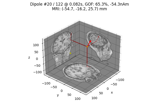mne.beamformer.rap_music¶
- mne.beamformer.rap_music(evoked, forward, noise_cov, n_dipoles=5, return_residual=False, verbose=None)[source]¶
RAP-MUSIC source localization method.
Compute Recursively Applied and Projected MUltiple SIgnal Classification (RAP-MUSIC) on evoked data.
Note
The goodness of fit (GOF) of all the returned dipoles is the same and corresponds to the GOF of the full set of dipoles.
- Parameters
- evokedinstance of
Evoked Evoked data to localize.
- forwardinstance of
Forward Forward operator.
- noise_covinstance of
Covariance The noise covariance.
- n_dipoles
int The number of dipoles to look for. The default value is 5.
- return_residualbool
If True, the residual is returned as an Evoked instance.
- verbosebool,
str,int, orNone If not None, override default verbose level (see
mne.verbose()and Logging documentation for more). If used, it should be passed as a keyword-argument only.
- evokedinstance of
- Returns
See also
Notes
The references are:
J.C. Mosher and R.M. Leahy. 1999. Source localization using recursively applied and projected (RAP) MUSIC. Signal Processing, IEEE Trans. 47, 2 (February 1999), 332-340. DOI=10.1109/78.740118 https://doi.org/10.1109/78.740118
Mosher, J.C.; Leahy, R.M., EEG and MEG source localization using recursively applied (RAP) MUSIC, Signals, Systems and Computers, 1996. pp.1201,1207 vol.2, 3-6 Nov. 1996 doi: 10.1109/ACSSC.1996.599135
New in version 0.9.0.
